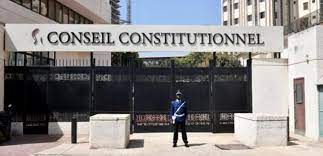APA – Dakar (Senegal) Senegal’s constitutional court has gone against President Macky Sall and the National Assembly by ruling that the postponement of the presidential election until 25 February runs contrary to the law.
By Oumar Dembélé
Moussa Diaw, a political science lecturer and researcher at the Gaston Berger University in Saint-Louis, in the north of the country, talks to APA about this decision by the highest authority, which has huge political consequences, before suggesting the best way for President Sall to resolve the crisis.
What do you think of the decision of the constitutional court to annul the decree of the president that cancelled the convocation of the electoral council and the postponement of the presidential election decided by parliament?
MS: By annulling the aforementioned law and decree, the constitutional court ruled where it was expected to rule in order to restore the rule of law and democracy. The decisions of the constitutional court make it possible to establish the principles and rules for respecting the fundamental law, i.e. the constitution. It contributes to calming the political game by giving instructions in accordance with the constitutional and political framework. In this way, it reminds the executive of its responsibility to respect the decisions of this high regulatory body for compliance with the law. Despite some criticism, the constitutional court has strengthened its image and its role in the balance of power and in ensuring the legal and political stability of the country.
What are the political consequences for the Senegalese Democratic Party (PDS), whose MPs, with the support of their colleagues in the presidential coalition, Benno Bokk Yakaar (United in Hope), managed to postpone the presidential elections until 15 December 2024?
MS: The big loser in this political manoeuvre is Benno, through it the President of the Republic, but also the PDS, which has taken the risk of playing with fire in a strategy whose failure will have disastrous consequences. We are aware that this parliamentary commission of inquiry, initiated by Karim Wade (the disqualified PDS candidate), was intended to postpone the elections in order to reshuffle the political deck. But this defeat risks further marginalising the PDS, which appears to be a party used to “political deals”. It will find it difficult to regain its political footing, given its outdated policies and political practices.
How do you understand the expression “earliest possible date” used by the constitutional court in its decision? Does it mean that the vote must take place before 2 April 2024?
MS: By using the term “earliest possible date,” the constitutional court leaves it to the Executive to resume consultations in order to choose a consensual date for the organisation of election that complies with the provisions of the constitution. Obviously, this will take into account the end of the mandate of the outgoing president (Macky Sall), i.e. 2 April 2024.
In a recent interview with an American media outlet, Macky Sall refused to say whether he would accept the constitutional court’s decision if the postponement of the presidential election were to be overturned. What would be his best position at this stage of the political game?
MS: He had said that, but given the various pressures and, above all, the political context, he has no choice but to apply the decisions of the constitutional court. It should be remembered that when he received the (so-called) “unsuccessful candidates,” he told them to abide by the decisions of the court. Now, in order not to plunge his country into a situation of uncertainty and unnecessary risk, all he has to do is apply the decisions of the constitutional court without appeal. The council leaves it to him to propose a new date. Before doing so, the president must open consultations to set a date in agreement with the political players in order to find a way out of the crisis.
ODL/ac/lb/as/APA


